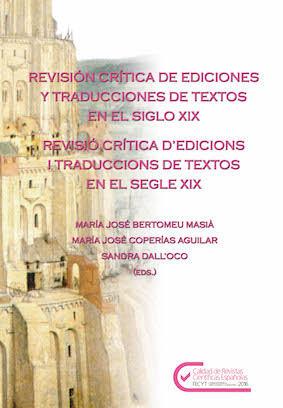Menéndez i Pelayo i el Libro de buen amor
DOI:
https://doi.org/10.7203/qdfed.22.11255Paraules clau:
Menéndez i Pelayo, libro de buen amor, Juan Ruiz, història de la literatura, cànon Resum
Resum
En aquest article s'analitzen les aportacions de Marcelino Menéndez i Pelayo sobre el Libro de buen amor en l'Antologia de poetes lírics castellans (1892: LIII-CXIV). Aquest treball va ser fonamental per a la consagració de l'obra de Juan Ruiz en el cànon literari espanyol. Menéndez i Pelayo va reclamar una edició íntegra del text conservat en els manuscrits coneguts, que superara la versió de Sánchez (1790), i va apuntar una sèrie de problemes sobre el títol, la data de composició i les fonts, que més endavant van constituir importants línies de recerca en els treballs filològics que s'han dedicat al Llibre de bon amor.
 Descàrregues
Descàrregues
Descàrregues
Publicades
Com citar
-
Resum771
-
PDF (Español)1737
-
PDF97
-
PDF 89
Número
Secció
Llicència
 Este obra está bajo una licencia de Creative Commons Reconocimiento-NoComercial-SinObraDerivada 4.0 Internacional.
Este obra está bajo una licencia de Creative Commons Reconocimiento-NoComercial-SinObraDerivada 4.0 Internacional.
Tots els documents inclosos a OJS són d'accés lliure i propietat dels seus autors i/o institucions editores, i per tant, qualsevol acte de reproducció, comercialització, comunicació pública o transformació total o parcial necessita el consentiment exprés i escrit d'aquests.
________
Authors who publish with this journal agree to the following terms:
- Authors retain copyright and grant the journal right of first publication with the work simultaneously licensed under a Creative Commons Attribution License that allows others to share the work with an acknowledgement of the work's authorship and initial publication in this journal.
- Authors are able to enter into separate, additional contractual arrangements for the non-exclusive distribution of the journal's published version of the work (e.g., post it to an institutional repository or publish it in a book), with an acknowledgement of its initial publication in this journal.
- Authors are permitted and encouraged to post their work online (e.g., in institutional repositories or on their website) prior to and during the submission process, as it can lead to productive exchanges, as well as earlier and greater citation of published work (See The Effect of Open Access).



